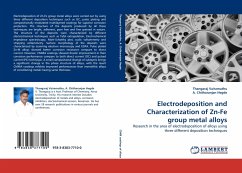Electrodeposition of Zn-Fe group metal alloys were carried out by using three different deposition techniques such as DC, pulse plating and compositionally modulated multilayered coatings for superior corrosion protection. The structure of the deposits produced by all these techniques are bright, adherent, pore free and fine grained in nature. The structure of the deposits were characterized by different electrochemical techniques such as Tafel extrapolation, Electrochemical impedance spectroscopy, Mott-Schottky plot, cyclic voltammetry and stripping voltammetry. Surface morphology of the deposits were characterized by scanning electron microscopy and EDAX. Pulse plated Zn-M alloys showed better corrosion resistance compare to direct current. However, CMMA coatings showed drastic improvement in their corrosion performance compare to both direct current (DC) and pulsed current (PC) technique. A small compositional change of sublayers brings a significant change in the phase structure of alloys, with the result CMMA coatings exhibits improved performances than monolithic alloys of constituting metals having same thickness.
Bitte wählen Sie Ihr Anliegen aus.
Rechnungen
Retourenschein anfordern
Bestellstatus
Storno

